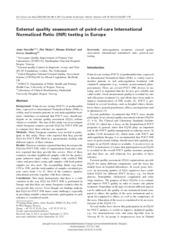| dc.contributor.author | Stavelin, Anne | en_US |
| dc.contributor.author | Meijer, Piet | en_US |
| dc.contributor.author | Kitchen, Dianne | en_US |
| dc.contributor.author | Sandberg, Sverre | en_US |
| dc.date.accessioned | 2013-12-16T10:28:07Z | |
| dc.date.available | 2013-12-16T10:28:07Z | |
| dc.date.issued | 2011-09 | eng |
| dc.Published | Clinical Chemistry and Laboratory Medicine 50(1): 81–88 | eng |
| dc.identifier.issn | 1437-4331 | |
| dc.identifier.issn | 1434-6621 | |
| dc.identifier.uri | https://hdl.handle.net/1956/7606 | |
| dc.description.abstract | Background: Point-of-care testing (POCT) of prothrombin time, expressed as International Normalized Ratio (INR), is widely used to monitor patients in oral anticoagulation treatment. Guidelines recommend that POCT users should participate in an external quality assessment (EQA) scheme whenever available. The aim of this study was to investigate which European countries provide EQA for POCT INR and to compare how these schemes are organized. Methods: Thirty European countries were invited to participate in this study. Those who reported that they provide EQA for POCT INR filled in a questionnaire dealing with different aspects of their schemes. Results: Nineteen countries reported that they do not provide EQA for POCT INR, while 12 organizations from nine countries reported that they provide this service. Most of these countries circulate lyophilized samples with for the participants unknown target values. Samples with certified INR values and procedures using split samples with fresh patient samples are also used. The acceptability limits vary from 15% to 30%, and the total number of samples circulated per year varies from 1 to 12. Most of the countries organize educational activities together with their schemes. Conclusions: This study demonstrates that there is a wide variation in the way EQA for POCT INR is performed in Europe and that there are many European countries that do not provide this service. Even though our findings indicate that EQA for POCT INR draws some challenges, especially in providing suitable control materials, participation in such schemes is considered useful. | en_US |
| dc.language.iso | eng | eng |
| dc.publisher | Walter de Gruyter | eng |
| dc.relation.ispartof | <a href="http://hdl.handle.net/1956/7607" target="blank">Analytical quality control of INR measurements in primary care</a> | eng |
| dc.subject | Anticoagulation treatment | eng |
| dc.subject | External quality assessment | eng |
| dc.subject | International normalized ratio | eng |
| dc.subject | Point-of-care testing | eng |
| dc.title | External quality assessment of point-of-care International Normalized Ratio (INR) testing in Europe | en_US |
| dc.type | Peer reviewed | |
| dc.type | Journal article | |
| dc.description.version | publishedVersion | en_US |
| dc.rights.holder | Copyright 2011 by Walter de Gruyter | |
| dc.identifier.doi | https://doi.org/10.1515/cclm.2011.719 | |
| dc.identifier.cristin | 922733 | |
| dc.source.journal | Clinical Chemistry and Laboratory Medicine | |
| dc.source.40 | 50 | |
| dc.source.14 | 1 | |
| dc.source.pagenumber | 81-88 | |
